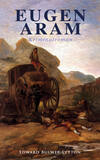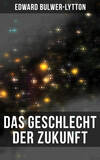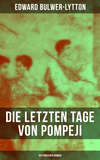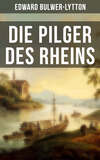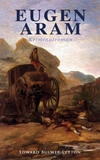Kitabı oku: «What Will He Do with It? — Volume 08», sayfa 4
"But you forget that our friend told me that he had appealed to—to Mr. Darrell on his return'to England: that Mr. Darrell had peremptorily refused to credit the claim; and had sternly said that, even if Sophy's birth could be proved, he would not place under his father's roof the grandchild of William Losely."
"True; and yet you hoped reasonably enough to succeed where he, poor outcast, had failed."
"Yes, yes; I did hope that Sophy—her manners formed, her education completed—all her natural exquisite graces so cultured and refined, as to justify pride in the proudest kindred—I did so hope that she should be brought, as it were by accident, under his notice; that she would interest and charm him; and that the claim, when made, might thus be welcomed with delight. Mr. Darrell's abrupt return to a seclusion so rigid forbids the opportunity that ought easily have been found or made if he had remained in London. But suddenly, violently to renew a claim that such a man has rejected, before he has ever seen that dear child- before his heart and his taste plead for her—who would dare to do it? or, if so daring, who could hope success?"
"My dear Lady Montfort, my noble cousin, with repute as spotless as the ermine of your robe—who but you?"
"Who but I? Any one. Mr. Darrell would not even read through a letter addressed to him by me."
George stared with astonishment. Caroline's face was downcast—her attitude that of profound humiliated dejection.
"Incredible!" said he at length. "I have always suspected, and so indeed has my uncle, that Darrell had some cause of complaint against your mother. Perhaps he might have supposed that she had not sufficiently watched over his daughter, or had not sufficiently inquired into the character of the governess whom she recommended to him; and that this had led to an estrangement between Darrell and your mother, which could not fail to extend somewhat to yourself. But such misunderstandings can surely now be easily removed. Talk of his not reading a letter addressed to him by you! Why, do I not remember, when I was on a visit to my schoolfellow, his son, what influence you, a mere child yourself, had over that grave, busy man, then in the height of his career—how you alone could run without awe into his study—how you alone had the privilege to arrange his books, sort his papers—so that we two boys looked on you with a solemn respect, as the depositary of all his state secrets—how vainly you tried to decoy that poor timid Matilda, his daughter, into a share of your own audacity!—Is not all this true?"
"Oh yes, yes—old days gone for ever!"
"Do I not remember how you promised that, before I went back to school, I should hear Darrell read aloud—how you brought the volume of Milton to him in the evening—how he said, 'No, to-morrow night; I must now go to the House of Commons'—how I marvelled to hear you answer boldly, 'To-morrow night George will have left us, and I have promised that he shall hear you read'—and how, looking at you under those dark brows with serious softness, he said: 'Right: promises once given, must be kept. But was it not rash to promise in another's name?'—and you answered, half gently, half pettishly, 'As if you could fail me!' He took the book without another word, and read. What reading it was too! And do you not remember another time, how—"
LADY MONTFORT (interrupting with nervous impatience).—"Ay, ay—I need no reminding of all—all! Kindest, noblest, gentlest friend to a giddy, heedless child, unable to appreciate the blessing. But now, George, I dare not, I cannot write to Mr. Darrell."
George mused a moment, and conjectured that Lady Montfort had, in the inconsiderate impulsive season of youth, aided in the clandestine marriage of Darrell's daughter, and had become thus associated in his mind with the affliction that had embittered his existence. Were this so, certainly she would not be the fitting, intercessor on behalf of Sophy. His thoughts then turned to his uncle, Darrell's earliest friend, not suspecting that Colonel Morley was actually the person whom Darrell had already appointed his adviser and representative in all transactions that might concern the very parties under discussion. But just as he was about to suggest the expediency of writing to Alban to return to England, and taking him into confidence and consultation, Lady Montfort resumed, in a calmer voice and with a less troubled countenance:
"Who should be the pleader for one whose claim, if acknowledged, would affect his own fortunes, but Lionel Haughton?—Hold!—look where yonder they come into sight—there by the gap in the evergreens. May we not hope that Providence, bringing those two beautiful lives together, gives a solution to the difficulties which thwart our action and embarrass our judgment? I conceived and planned a blissful romance the first moment I gathered fran Sophy's artless confidences the effect that had been produced on her whole train of thought and feeling by the first meeting with Lionel in her childhood; by his brotherly, chivalrous kindness, and, above all, by the chance words he let fall, which discontented her with a life of shift and disguise, and revealed to her the instincts of her own holiest truthful nature. An alliance between Lionel Haughton and Sophy seemed to me the happiest possible event that could befall Guy Darrell. The two branches of his family united—a painful household secret confined to the circle of his own kindred—granting Sophy's claim never perfectly cleared up, but subject to a tormenting doubt—her future equally assured—her possible rights equally established—Darrell's conscience and pride reconciled to each other. And how, even but as wife to his young kinsman, he would learn to love one so exquisitely endearing!" [Lady Montfort paused a moment, and then resumed.] "When I heard that Mr. Darrell was about to marry again, my project was necessarily arrested."
"Certainly," said George, "if he formed new ties, Sophy would be less an object in his existence, whether or not he recognised her birth. The alliance between her and Lionel would lose many of its advantages; and any address to him on Sophy's behalf would become yet more ungraciously received."
LADY MONTFORT.—"In that case I had resolved to adopt Sophy as my own child; lay by from my abundant income an ample dowry for her; and whether Mr. Darrell ever know it or not, at least I should have the secret joy to think that I was saving him from the risk of remorse hereafter—should she be, as we believe, his daughter's child, and have been thrown upon the world destitute;—yes, the secret joy of feeling that I was sheltering, fostering as a mother, one whose rightful home might be with him who in my childhood sheltered, fostered me!"
GEORGE (much affected).—"How, in proportion as we know you, the beauty which you veil from the world outshines that which you cannot prevent the world from seeing! But you must not let this grateful enthusiasm blind your better judgment. You think these young persons are beginning to be really attached to each other. Then it is the more necessary that no time should be lost in learning how Mr. Darrell would regard such a marriage. I do not feel so assured of his consent as you appear to do. At all events, this should be ascertained before their happiness is seriously involved. I agree with you that Lionel is the best intermediator to plead for Sophy; and his very generosity in urging her prior claim to a fortune that might otherwise pass to him is likely to have weight with a man so generous himself as Guy Darrell is held to be. But does Lionel yet know all? Have you yet ventured to confide to him, or even to Sophy herself, the nature of her claim on the man who so proudly denies it?"
"No—I deemed it due to Sophy's pride of sex to imply to her that she would, in fortune and in social position, be entitled to equality with those whom she might meet here. And that is true, if only as the child whom I adopt and enrich. I have not said more. And only since Lionel has appeared has she ever seemed interested in anything that relates to her parentage. From the recollection of her father she naturally shrinks—she never mentions his name. But two days ago she did ask timidly, and with great change of countenance, if it was through her mother that she was entitled to a rank higher than she had hitherto known; and when I answered 'yes,' she sighed, and said 'But my dear grandfather never spoke to me of her; he never even saw my mother.'"
GEORGE.—"And you, I suspect, do not much like to talk of that mother. I have gathered from you, unawares to yourself, that she was not a person you could highly praise; and to me, as a boy, she seemed, with all her timidity, wayward and deceitful."
LADY MONTFORT.—"Alas! how bitterly she must have suffered—and how young she was! But you are right; I cannot speak to Sophy of her mother, the subject is connected with so much sorrow. But I told her 'that she should know all soon,' and she said, with a sweet and melancholy patience, 'When my poor grandfather will be by to hear; I can wait.'"
GEORGE.—"But is Lionel, with his quick intellect and busy imagination, equally patient? Does he not guess at the truth? You have told him that you do meditate a project which affects Guy Darrell, and required his promise not to divulge to Darrell his visits in this house."
LADY MONTFORT—"He knows that Sophy's paternal grandfather was William Losely. From your uncle he heard William Losely's story, and—"
GEORGE.—"My uncle Alban?"
LADY MOSTFORT.—"Yes; the Colonel was well acquainted with the elder Losely in former days, and spoke of him to Lionel with great affection. It seems that Lionel's father knew him also, and thoughtlessly involved him in his own pecuniary difficulties. Lionel was not long a visitor here before he asked me abruptly if Mr. Waife's real name was not Losely. I was obliged to own it, begging him not at present to question me further. He said then, with much emotion, that he had an hereditary debt to discharge to William Losely, and that he was the last person who ought to relinquish belief in the old man's innocence of the crime for which the law had condemned him, or to judge him harshly if the innocence were not substantiated. You remember with what eagerness he joined in your search, until you positively forbade his interposition, fearing that should our poor friend hear of inquiries instituted by one whom he could not recognise as a friend, and might possibly consider an emissary of his son's, he would take yet greater pains to conceal himself. But from the moment that Lionel learned that Sophy's grandfather was William Losely, his manner to Sophy became yet more tenderly respectful. He has a glorious nature, that young man! But did your uncle never speak to you of William Losely?"
"No. I am not surprised at that. My uncle Alban avoids 'painful subjects.' I am only surprised that he should have revived a painful subject in talk to Lionel. But I now understand why, when Waife first heard my name, he seemed affected, and why he so specially enjoined me never to mention or describe him to my friends and relations. Then Lionel knows Losely's story, but not his son's connection with Darrell?"
"Certainly not. He knows but what is generally said in the world, that Darrell's daughter eloped with a Mr. Hammond, a man of inferior birth, and died abroad, leaving but one child, who is also dead. Still Lionel does suspect,—my very injunctions of secrecy must make him more than suspect, that the Loselys are somehow or other mixed up With Darrell's family history. Hush! I hear his voice yonder—they approach."
"My dear cousin, let it be settled between us, then, that you frankly and without delay communicate to Lionel the whole truth, so far as it is known to us, and put it to him how best and most touchingly to move Mr. Darrell towards her, of whom we hold him to be the natural protector. I will write to my uncle to return to England that he may assist us in the same good work. Meanwhile, I shall have only good tidings to communicate to Sophy in my new hopes to discover her grandfather through Merle."
Here, as the sun was setting, Lionel and Sophy came in sight,—above their heads, the western clouds bathed in gold and purple. Sophy, perceiving George, bounded forwards, and reached his side, breathless.
CHAPTER V
LIONEL HAUGHTON HAVING LOST HIS HEART, IT IS NO LONGER A QUESTION OF WHAT HE WILL DO WITH IT. BUT WHAT WILL BE DONE WITH IT IS A VERY GRAVE QUESTION INDEED.
Lionel forestalled Lady Montfort in the delicate and embarrassing subject which her cousin had urged her to open. For while George, leading away Sophy, informed her of his journey to Norwich, and his interview with Merle, Lionel drew. Lady Montfort into the house, and with much agitation, and in abrupt hurried accents, implored her to withdraw the promise which forbade him to inform his benefactor how and where his time had been spent of late. He burst forth with a declaration of that love with which Sophy had inspired him, and which Lady Montfort could not be but prepared to hear. "Nothing," said he, "but a respect for her more than filial anxiety at this moment could have kept my heart thus long silent. But that heart is so deeply pledged—so utterly hers—that it has grown an ingratitude, a disrespect—to my generous kinsman, to conceal from him any longer the feelings which must colour my whole future existence. Nor can I say to her, 'Can you return my affection?— will you listen to my vows?—will you accept them at the altar?'—until I have won, as I am sure to win, the approving consent of my more than father."
"You feel sure to win that consent, in spite of the stain on her grandfather's name?"
"When Darrell learns that, but for my poor father's fault, that name might be spotless now!—yes! I am not Mr. Darrell's son—the transmitter of his line. I believe yet that he will form new ties. By my mother's side I have no ancestors to boast of; and you have owned to me that Sophy's mother was of gentle birth. Alban Morley told me, when I last saw him, that Darrell wishes me to marry, and leaves me free to choose my bride. Yes; I have no doubt of Mr. Darrell's consent. My dear mother will welcome to her heart the prize so coveted by mine; and Charles Haughton's son will have a place at his hearth for the old age of William Losely. Withdraw your interdict at once, dearest Lady Montfort, and confide to me all that you have hitherto left unexplained, but have promised to reveal when the time came. The time has come."
"It has come," said Lady Montfort, solemnly; "and Heaven grant that it may bear the blessed results which were in my thoughts when I took Sophy as my own adopted daughter, and hailed in yourself the reconciler of conflicting circumstance. Not under this roof should you woo William Losely's grandchild. Doubly are you bound to ask Guy Darrell's consent and blessing. At his hearth woo your Sophy—at his hands ask a bride in his daughter's child."
And to her wondering listener, Cayoline Montford told her grounds for the belief that connected the last of the Darrells with the convict's grandchild.





